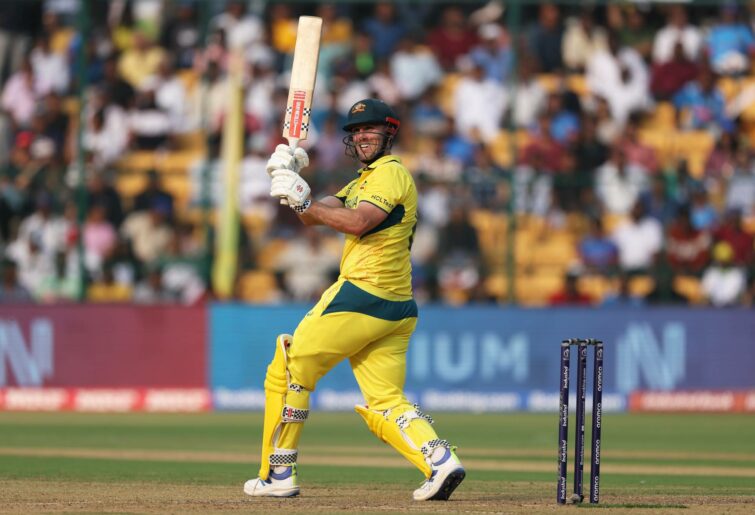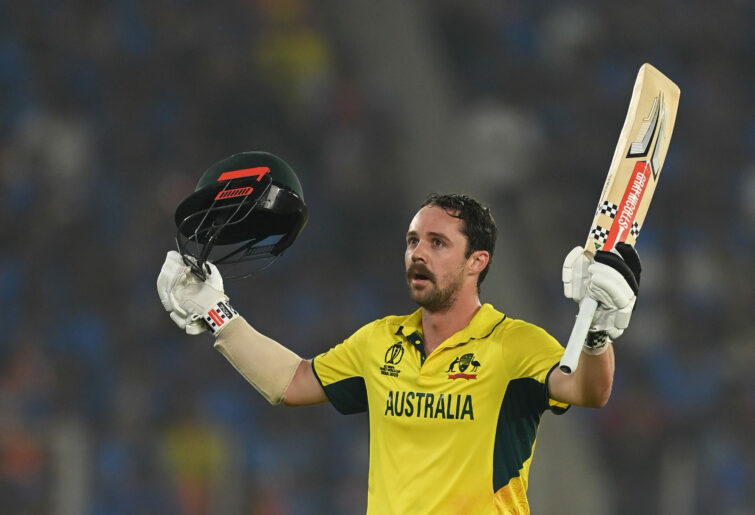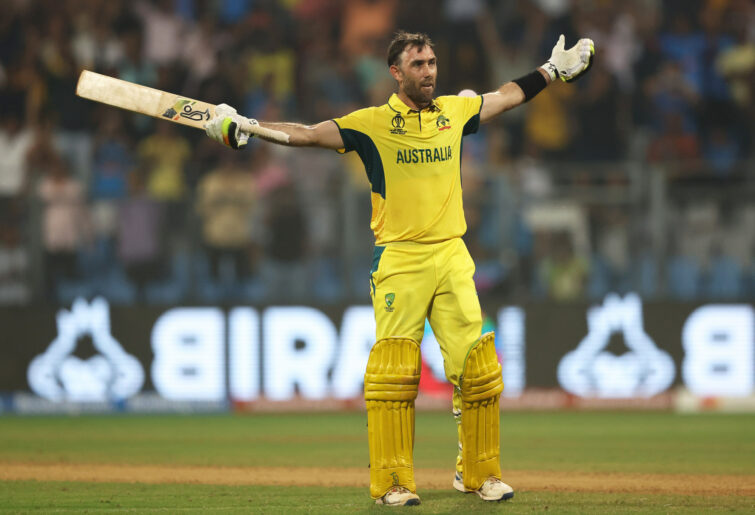Calamitous miss as Lucknow botch near certain run out with the game on the line
With Rajasthan needing 25 off 17, both batsmen ended up at the same end but the bowler dropped the throw from his teammate -…
For the most part of the recent World Cup, we saw domination by the batting over the bowling. With most pitches offering little or no help for the bowlers, we saw sixes and fours flowing from the bat of the aggressive stroke-makers. So, this article is all about the batters as I try to find the best partnerships by position from over six weeks of action in India.
David Warner & Mitch Marsh – 259 vs Pakistan at Bengaluru: Back in 1975, at Lord’s, in what is officially the first match in Men’s WC history, Sunil Gavaskar took 174 deliveries to score 36 not out. In 1983, Mohsin Khan, the charismatic Pakistan opener, only did marginally better; ‘smashing’ 70 from 176 balls against the Windies pace battery in the second semi-final.
Fast forward four decades and the role of the openers have changed completely. Here, Quinton de Kock smashed four hundreds, but poor form of his opening partner Temba Bavuma meant that South Africaa didn’t get as many good opening stands.
India’s ‘Rohit Gambit’ ensured that the hosts got blazing starts in most matches. But in my opinion, Australia got the best service from their openers. Mitch Marsh did a decent job before Travis Head turned the event on its head.
Both Warner and Marsh went into the Pakistan match under a bit of pressure. In fact, the whole Australian team was under some pressure. One win in three matches wasn’t an ideal start for the five-time champions. Aided by fielding lapses, the pair put the Aussies in the driving seat; and although the middle order failed to deliver, Adam Zampa with four wickets restricted their opponents to 305 all out, 63 runs short of their target.

Mitch Marsh. (Photo by Matthew Lewis-ICC/ICC via Getty Images)
Fakhar Zaman & Babar Azam – 194* vs NZ at Bengaluru: On the opening day of the event, Devon Conway and Rachin Ravindra put on an unbeaten stand of 273 against England, but I still felt that Pakistan duo’s effort deserves greater credit.
Needing to win every match to have any realistic hope of staying in the race, the Pakistan team seemed out of it at the half way stage. Another hundred by the in-form Ravindra, and useful contributions from everyone ensured a total of 6-401 for the Kiwis.
But Pakistan reached 1 for 200 from just 25.3 overs to win comfortably by the DLS method. Fakhar Zaman and skipper Babar Azam had put on 194 for the second wicket before weather had the final say. Zaman was especially impressive in his 81-ball 126, hitting 11 sixes and 8 fours.
Given the inconsistency of the Pakistan middle order, the Kiwis perhaps felt a bit unlucky; but, nothing should be taken away from the Pakistan duo; on this rainy day they were simply brilliant
Rachin Ravindra & Daryl Mitchell – 159 vs India at Dharamsala: Over the last two years or so, Daryl Mitchell from Hamilton has become something like a ‘century for a losing cause’ specialist. After his three hundreds during the English summer of 2022 all went in vain, he smashed couple of cracking hundreds against India, but neither had any real impact on the eventual outcome of the match.
On both occasions, he shared impressive third wicket stands, but I have picked the one in the league match, as for a brief period, the Mitchell-Ravindra pair had put the home side under real pressure.
Coming to the wicket with the scoreboard reading 2 for 19, the Ravindra-Mitchell partnership initially started with some caution. But once in, they opened up and none of the Indian bowlers seemed to have any impact on the pair.
Mohammed Shami eventually dismissed Ravindra for a well-made 75, and after that Shami became unplayable to all the NZ batters except Mitchell. He finished on 130, but the Black Caps only managed a total of 273. And it was never going to be enough against India.
Virat Kohli & KL Rahul – 164 vs Australia at Chennai: Travis Head and Marnus Labuschagne produced a fabulous fourth-wicket stand in the final. It was a great effort no doubt, but in my opinion, the real job was done by the pace bowlers. Also, without taking anything from Marnus, it was basically a one-man show.
Thus, I have gone for the Kohli-Rahul stand which came together with India reeling at 3 down for just 2 runs. Australia’s new ball attack of Mitch Starc and Josh Hazlewood was creating panic in the host’s bating lineup. But the experienced duo first saw off the new ball, and then accelerated just in the right time.
In the end, India won by six wickets (with POTM Rahul finishing on an unbeaten 97); but actually it was lot closer than that. One more wicket with the new ball and it would have been a different story.

Travis Head. (Photo by Gareth Copley/Getty Images)
Tom Latham and Glenn Phillips – 144 vs Afghanistan at Chennai: The Black Caps went into this match as the firm favourites; but batting first, they found themselves in a bit of bother at 4 for 110. The varied Afghan attack looked to be on top till the Latham-Philips partnership changed the course of this match.
The young Afghans found the target of 289 well beyond their reach.
Scott Edwards & Sybrand Engelbrecht – 78 vs Bangladesh at Kolkata: It may be not known to many cricket lovers of the current generation, but the rivalry between the Dutch and the Tigers at the Associate level was quite intense during the 1980s and the 90s.
Both in 1990 and in 1994 ICC Trophy matches, the Dutch inflicted humiliating defeats on the Tigers, and here they created a major upset; winning handsomely by 87 runs at the Eden Gardens.
For the first part of the Dutch innings, things looked to be going in the normal direction. A number of their top-order batters got starts but then threw it away, as they reached 5-107. It was the sixth-wicket stand between the skipper Scott Edwards and Engelbrecht that gave the innings the much-needed stability.
Edwards top scored with 68 in a total of 229, and then medium pacer Paul van Meekeren took 4 for 23 to destroy the Tigers’ resistance.
The highest sixth-wicket stand this WC came at the Wankhede, where Heinrich Klaasen and Marco Jansen smashed 151 in less than 13 overs against a hapless England attack.
Sybrand Engelbrecht & Logan van Beek – 130 vs Sri Lanka at Lucknow: Having made his ODI debut at the age of 35 in the WC match against NZ, Sybrand Engelbrecht has wasted little time in making his mark. At Lucknow, his brave 70 and Van Beek’s solid 59 helped the Dutch recover from 6 for 91 to a respectable total of 262 all out. And although it wasn’t enough, the lower order effort of the Dutch batters caught the attention of everyone.
Glenn Maxwell & Pat Cummins – 202* vs Afghanistan at Mumbai: It was an automatic choice. The bravado of Maxwell and the Tavaresque (12 runs from 68 balls) display from the skipper saw the Aussies snatch victory from the jaws of defeat. In the process, the pair broke all kinds of records.
Two other eighth-wicket stands deserve mention though. Netherlands skipper Edwards on his way to a match-winning knock of 78* shared a stand of 64 with Van Der Merwe against SA at Dharamsala. And of course, there was the Cummins-Starc bravery which saw Australia prevail in the second semi-final.

Glenn Maxwell. (Photo by Robert Cianflone/Getty Images)
Gus Atkinson & Mark Wood – 70 vs South Africa at Mumbai: With the fate of the game at the Wankhede already decided, the two pacers gave the Proteas bowling some old-fashioned ‘humpty’ to entertain the crowd. Atkinson scored 35 with 7 fours, while Wood – the tormentor of the Australian batters in the previous summer – preferred the aerial route with his unbeaten 43 including 5 sixes and 2 fours.
Keshav Maharaj & Tabraiz Shamsi – 11* vs Pakistan at Chennai: The closest finish in the WC saw SA win by one wicket thanks mainly to the bravery of their two frontline spinners; and perhaps there was a bit of luck involved as well.
Finally, as a footnote, I would like to add that the record for the shortest partnership (in terms of balls) in ODI history was created in this WC, at Delhi, between Bangladesh and Sri Lanka. The fifth wicket partnership between Charith Asalanka and Angelo Matthews lasted exactly zero deliveries.